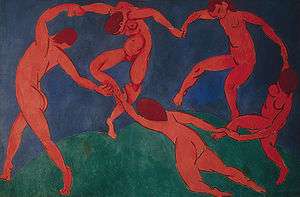Dance (Matisse)
_by_Matisse.jpg) | |
| Artist | Henri Matisse |
|---|---|
| Year | 1909 |
| Type | Oil on canvas |
| Dimensions | 259.7 cm × 390.1 cm (102.2 in × 153.6 in) |
| Location | Museum of Modern Art, New York City |
The Dance (La Danse) refers to either of two related paintings made by Henri Matisse between 1909 and 1910. The first, preliminary version is Matisse's study for the second version. The composition or arrangement of dancing figures is reminiscent of Blake's watercolour "Oberon, Titania and Puck with fairies dancing" from 1786.[1]
Dance (I)
In March 1909, Matisse painted a preliminary version of this work, known as Dance (I).[2] It was a compositional study and uses paler colors and less detail.[3] The painting was highly regarded by the artist who once called it "the overpowering climax of luminosity"; it is also featured in the background of Matisse's La Danse with Nasturtiums (1912).
It was donated by Nelson A. Rockefeller in honor of Alfred H. Barr, Jr. to the Museum of Modern Art in New York.
Dance
 | |
| Artist | Henri Matisse |
|---|---|
| Year | 1910 |
| Type | Oil on canvas |
| Dimensions | 260 cm × 391 cm (102.4 in × 153.9 in) |
| Location | The Hermitage, St. Petersburg |
Dance, is a large decorative panel, painted with a companion piece, Music, specifically for the Russian businessman and art collector Sergei Shchukin, with whom Matisse had a long association. Until the October Revolution of 1917, this painting hung together with Music on the staircase of Shchukin's Moscow mansion.[4]
The painting shows five dancing figures, painted in a strong red, set against a very simplified green landscape and deep blue sky. It reflects Matisse's incipient fascination with primitive art, and uses a classic Fauvist color palette: the intense warm colors against the cool blue-green background and the rhythmical succession of dancing nudes convey the feelings of emotional liberation and hedonism. The painting is often associated with the "Dance of the Young Girls" from Igor Stravinsky's famous musical work The Rite of Spring.
Dance is commonly recognized as "a key point of (Matisse's) career and in the development of modern painting".[5] It generally resides in the Hermitage Museum in St. Petersburg, but was loaned to Hermitage Amsterdam for a period of six weeks from April 1 to May 9, 2010.[6]
Notes and references
- ↑ For visual comparison see the record at the Tate Gallery
- ↑ John Elderfield. Henri Matisse: A Retrospective. The Museum of Modern Art, New York, 1992. Page 181.
- ↑ MoMA.org - Dance (I)
- ↑ State Hermitage Museum - Dance
- ↑ Russell T. Clement. Four French Symbolists. Greenwood Press, 1996. Page 114.
- ↑ Hermitage.nl - De Dans
